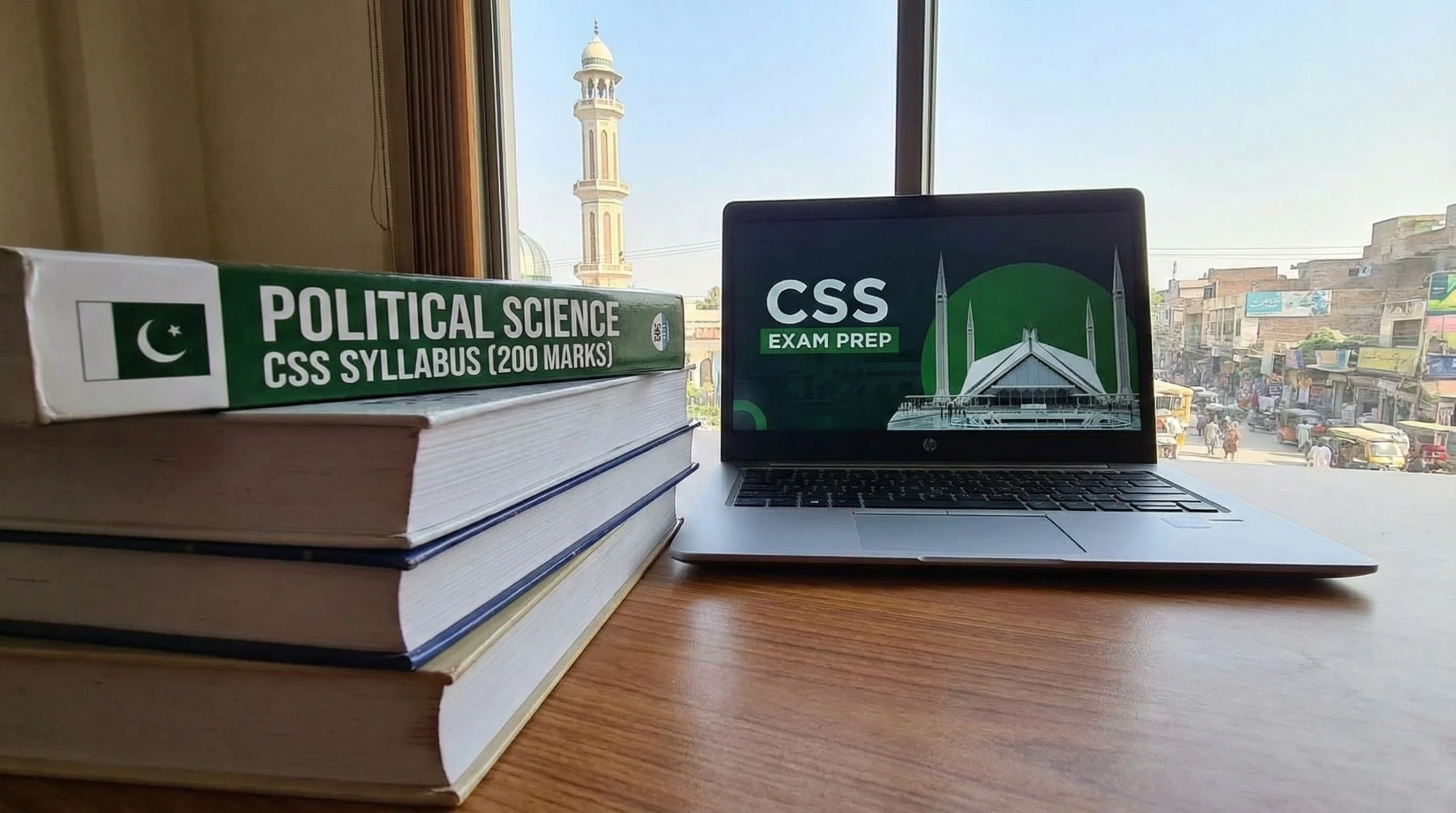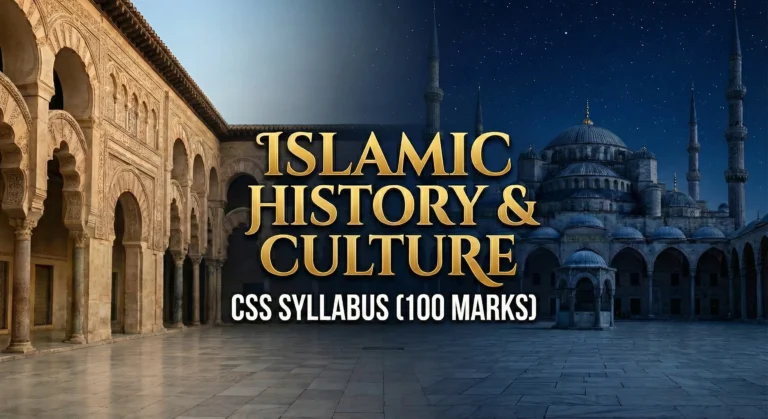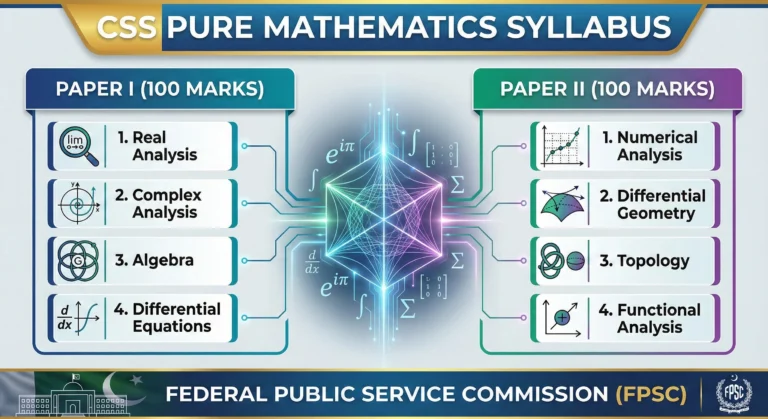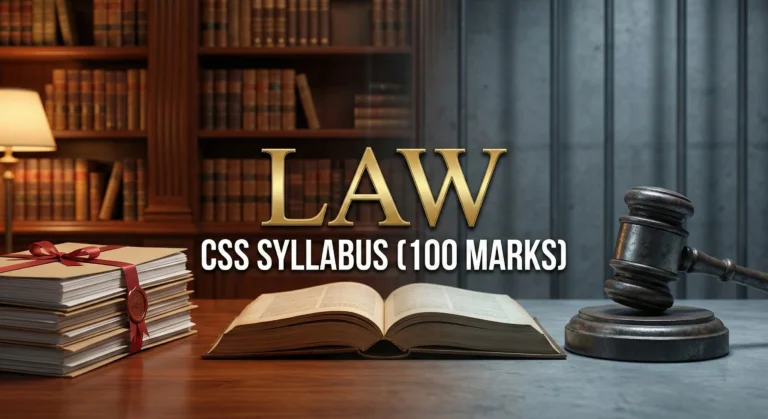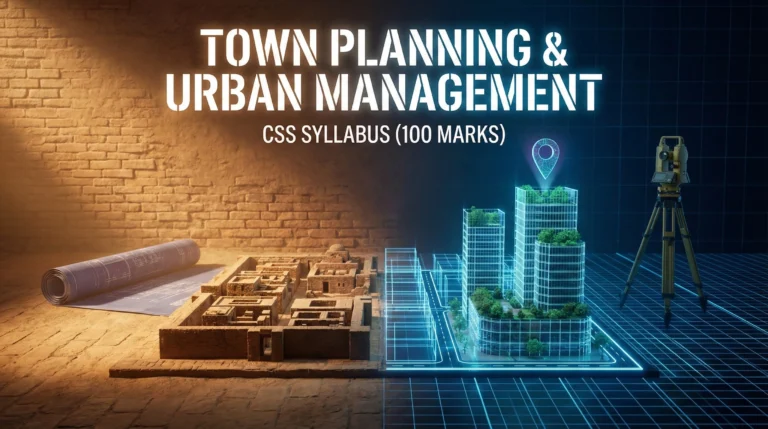Political Science CSS Syllabus 2026 (200 Marks) – Ultimate FPSC Easy & Complete Guide
Political Science is a high-scoring optional subject in the CSS exam conducted by FPSC. The Political Science CSS Syllabus overlaps with other important compulsory subjects, such as Current Affairs and Pakistan Affairs.
POLITICAL SCIENCE PAPER I – (Marks: 100)
Part-A (50 Marks)
I. Western Political Thought:
- Key Philosophers:
- Plato
- Aristotle
- Machiavelli
- Montesquieu
- Hobbes
- Locke
- Rousseau
- Kant
- Mill
- Bentham
- Hegel
- Marx
- Lenin
- Mao
- Gramsci
- Karl Popper
- Pierre Bourdieu
- John Rawls
- Francis Fukuyama
- Foucault
- Derrida
- Kierkegaard
- Jean-Paul Sartre
- René Descartes
II. Muslim Political Thought:
- Key Thinkers:
- Al-Farabi
- Al-Mawardi
- Ibn Rushd
- Imam Ghazali
- Ibn Taymiyyah
- Nizam-ul-Mulk Tusi
- Ibn Khaldun
- Shah Waliullah
- Allama Muhammad Iqbal
- Jamaluddin Afghani
- Rashid Rida
Part-B (50 Marks)
III. State System:
- Nature and Emergence of Modern Nation-State System
- Islamic Concept of State and Ummah
IV. Political Concepts (Western and Islamic):
- Sovereignty
- Justice
- Law
- Liberty
- Freedom
- Equality
- Rights and Duties
- Human Rights
- Political Authority and Power
V. Comparative Politics:
- Political Socialization
- Political Culture
- Political Development
- Political Recruitment
- Social Change
- Civil Society
- Violence and Terrorism in Politics
- Gender and Politics
- Women Empowerment
VI. Political Participation:
- Political Change and Revolution
- Elections and Electoral System
- Public Opinion
- Propaganda
- Political Parties
- Pressure Groups and Lobbies
VII. Political Institutions and Role of Government:
- Legislature
- Executive
- Judiciary
- Political Elites
- Civil and Military Bureaucracy
VIII. Forms of Government:
- Monarchy
- Democratic
- Dictatorship
- Totalitarian/Authoritarian
- Unitary
- Federal
- Confederation
- Presidential
- Parliamentary
IX. Political Ideologies:
- Capitalism
- Marxism
- Communism
- Socialism
- Totalitarianism
- Fascism
- Nationalism
- Islamic Political Ideology
X. Local Self-Government:
- Theory and Practice of Local Self-Government with Special Reference to Pakistan
- Comparative Analysis of Systems of Local Governance
- Public Administration and Public Policy
POLICTICAL SCIENCE PAPER II – (Marks: 100)
Part-A (30 Marks)
I. Comparative and Analytical Study of Political Systems:
- Political Systems of:
- U.S.A
- U.K
- France
- Germany
II. Global and Regional Integration:
- Globalization and Politics
- Global Civil Society
- Regional Politico-Economic Integration:
- European Union
- SAARC
- ECO
- International Financial Regimes:
- IMF
- WTO
Part-B (70 Marks)
III. Comparative and Analytical Study of Political Systems:
- Political Systems of:
- Turkey
- Iran
- Malaysia
- India
- China
IV. Political Movements in India (Colonial Period):
- Rise of Muslim Nationalism in South Asia and Pakistan Movement:
- Role of Sir Syed Ahmed Khan
- Allama Muhammad Iqbal
- Quaid-i-Azam Mohammad Ali Jinnah
V. Government and Politics in Pakistan:
- Constitution Making from 1947-1956
- Comparative and Critical Analysis of Constitutions:
- 1956 Constitution
- 1962 Constitution
- 1973 Constitution
- Constitutional Amendments (Up-to-Date)
- Federal Structure in Pakistan
- Central-Provincial Relations After 18th Amendment
- Political Culture of Pakistan
- Political Developments:
- Role of Civil and Military Bureaucracy
- Judiciary
- Feudalism
- Dynastic Politics
- Political Parties and Interest Groups
- Elections and Voting Behavior
- Religion and Politics
- Ethnicity and National Integration
VI. International Relations:
- History of International Relations (Post-World War II Period)
- Foreign Policy of Pakistan:
- National Interests and Major Determinants:
- Size/Geography
- Economic Development
- Security
- Advancement in Technology
- National Capacity
- Political Parties/Leadership
- Ideology
- National Interest
- Role of Press/Bureaucracy
- Social Structure
- Public Opinion
- Diplomacy
- National Interests and Major Determinants:
- Foreign Policy-Making Process in Pakistan
- External Factors:
- International Power Structure
- International Organizations
- World Public Opinion
- Reaction of Other States
FPSC RECOMMENDED BOOKS List for Political Science CSS Syllabus 2026
| S. No. | Title | Author |
|---|---|---|
| 1. | Pakistan’s Foreign Policy, 1947–2005 | Abdul Sattar |
| 2. | Democracy and Authoritarianism in South Asia | Ayesha Jalal |
| 3. | Military, Civil Society and Democratization in Pakistan | Akbar Zaidi |
| 4. | The Reconstruction of Religious Thought in Islam | Allama Iqbal |
| 5. | A History of Pakistan and Its Origins | Christophe Jaffrelot |
| 6. | Greek Political Thought: Plato & Aristotle | Ernest Barker |
| 7. | Political Thought from Plato to Present | Ebenstein |
| 8. | Political Thought in Medieval Islam | Erwin I. J. Rosenthal |
| 9. | Constitutional Developments in Pakistan | G. W. Choudhury |
| 10. | Comparative Politics Today: A Theoretical Framework | Gabriel A. Almond, G. Bingham Powell |
| 11. | Contemporary Political Analysis | Garles Worth James |
| 12. | A History of Political Theory | George Holland Sabine |
| 13. | Studies in Muslim Political Thought and Administration | H. K. Sherwani |
| 14. | Modern Islamic Political Thought | Hamid Enayat |
| 15. | Constitutional and Political History of Pakistan | Hamid Khan |
| 16. | Politics Among Nations: The Struggle for Power and Peace | Hans J. Morgenthau |
| 17. | Military and Politics in Pakistan | Hasan Askari Rizvi |
| 18. | Pakistan Foreign Policy: An Overview 1947–2004 (PILDAT) | Hasan Askari Rizvi |
| 19. | Pakistan and Geostrategic Environment: A Study of Foreign Policy | Hasan Askari Rizvi |
| 20. | International Politics: A Framework for Analysis | Holsti, K. J. |
| 21. | Pakistan: A Modern History | Ian Talbot |
| 22. | 21st Century Political Science: A Reference Handbook | John T. Ishiyama, Marijke Breuning |
| 23. | Political Thought from Plato to Present | Judith Herman |
| 24. | The Political System of Pakistan | K. B. Sayeed |
| 25. | Pakistan: A Political Study | Keith Callard |
| 26. | Pakistan: An Enigma of Political Development | Lawrence Ziring |
| 27. | Pakistan in the Twentieth Century | Lawrence Ziring |
| 28. | Pakistan: At the Crosscurrent of History | Lawrence Ziring |
| 29. | History of Muslim Philosophy | M. M. Sharif |
| 30. | History of Local Government in Pakistan | Masudul Hasan |
| 31. | Nationalism: The Nation-State and Nationalism | Montserrat Guibernau |
| 32. | Politics and the State in Pakistan | Muhammad Waseem |
| 33. | Government and Politics in Pakistan | Mushtaq Ahmad |
| 34. | Making of Pakistan | Noor ul Haq |
| 35. | Pattern of Government | Samuel H. Beer & Adam B. Ulam |
| 36. | Political Thinkers: From Socrates to the Present | Paul Kelly (Ed.) |
| 37. | Introduction to Political Science, Islamabad, National Book Foundation | Rodee Anderson et al. |
| 38. | Pakistan’s Foreign Policy: An Historical Analysis | S. M. Burke |
| 39. | State & Society in Pakistan | Shahid Javed Burki |
| 40. | Islami Riyasat | Syed Abul Aala Maudoodi |
| 41. | Khilafat o Malkoeyat | Syed Abul Aala Maudoodi |
| 42. | Ethno National Movements of Pakistan | Tahir Amin |
| 43. | Politics, Parties and Pressure Groups | V. O. Key Jr. |
| 44. | Democratization in Pakistan | Waseem, M. |
| 45. | Contemporary Political Philosophy: An Introduction | Will Kymlicka |
| 46. | History of Political Theories (Three Volumes) | William A. Dunning |
| 47. | International Relations: Politics and Economy in the 21st Century | William Nester |
FPSC Official Political Science CSS Syllabus
Here is the link to the Political Science CSS syllabus on FPSC official website

